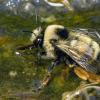We need your voice to help defend one of our most important wildlife protection laws.
Since 1973, the Endangered Species Act (ESA) has been at the forefront of species protection, placing the United States as a world leader in science-based conservation. The ESA is our nation’s most effective law for protecting animals and plants in danger of extinction, and it has prevented 99% of listed species from going extinct. Despite how effective this law has been at its intended purpose, the current administration has set its sights on weakening the ESA, to the detriment of the species it was designed to protect. The rusty patched bumble bee (Bombus affinis) teeters on the brink of extinction, and in 2017 it became the first bee in the continental United States to be listed under the ESA. The proposed changes could affect how the ESA will provide protections to this and other disappearing species.

The ESA was signed by a Republican president after passing through Congress with nearly universal bipartisan support. Public support for the ESA continues to be high. According to Ohio State University, three recent studies show that, on average, approximately 83% of the public—more than 4 out of 5 people—supports the ESA.
Despite such overwhelming support for this landmark legislation, the current administration is actively threatening to weaken the ESA by using administrative rule changes and bypassing congress, where these significant and lasting changes would be debated in the public eye.
One of the hallmark sections of the ESA stipulates that decisions must be made “solely on the basis of the best scientific and commercial data available” and “without reference to possible economic or other impacts of such determination.” These requirements ensure that potential economic impacts of an ESA listing do not stop a species from getting the protection it needs.
But under this new proposal from the Trump administration, listing decisions would couple with a study on the economic impacts (not benefits) of listing the species. An economic impact analysis could easily influence listing decisions and could divert valuable resources away from conserving species on the brink of extinction.

This is not the only threat to the ESA. Several bills are before Congress that would further weaken our ability to protect wildlife. The National Defense Authorization Act contains provisions that include prematurely removing protection for the American burying beetle (Nicrophorus americanus). The House version of the Farm Bill contains provisions that would weaken endangered-species protections from pesticides, and the Interior and EPA Appropriations bills for Fiscal Year 2019 contain riders that block judicial review, impeding every citizen’s right to hold our government accountable when it acts unlawfully.
Act now and have your voice heard. We suggest you take two actions: (1) Enter a comment in the Federal Register logging your opposition to these proposed changes; and (2) contact your US Representatives and Senators to let them know that you oppose any changes to weaken the Endangered Species Act.
Step 1: Enter a comment in the Federal Register
The Federal Register is the official record of government and the channel through which changes are announced and public comments accepted. The comment period for the proposed changes to the ESA ends on September 24, 2018, at 11:59 p.m. EDT. We need to let the federal government know that we do not support this proposed rule change, nor the weakening of the Endangered Species Act.
- Go to the Federal eRulemaking Portal: http://www.regulations.gov.
- In the Search box, enter FWS–HQ–ES–2018–0006, which is the docket number for this rulemaking.
- Then, in the Search panel on the left side of the screen, under the Document Type heading, click on the Proposed Rules link to locate this document.
- You may submit a comment by clicking on “Comment Now!”
Below is an example comment that could be filed. Please write your own comment or use any of the language below.
I strongly oppose the proposed rule changes to the Endangered Species Act proposed by the US Fish and Wildlife Service (FWS) and the National Marine Fisheries Service (NMFS). Despite the claim from politicians that only a minority of species have recovered after endangered species listing, the fact is the Endangered Species Act is our nation’s most effective law for protecting wildlife in danger of extinction, and has prevented 99% of listed species from going extinct. Weakening the Act with the proposed changes will have dramatic implications for species conservation at a time when the threats to all species are increasing, and an increasing number of species are imperiled.
I especially oppose that listing decisions would be coupled with a study on the economic impacts (not benefits) of listing the species. An economic impact analysis could easily influence listing decisions, not to mention be a waste of taxpayer funds.
The Endangered Species Act is a hallmark piece of legislation that has had tremendous benefits for this nation’s iconic wildlife. The proposed changes to the ESA would weaken the law, change the clearly stated and intended purpose of the law, and have negative lasting impacts on our environment for future generations. For these reasons, I strongly oppose the suggested changes.

Step 2: Contact your US Representatives and Senators to let them know that you oppose any changes to the Endangered Species Act.
Find your member(s) of Congress here: https://www.govtrack.us/congress/members. From there you can find their contact information.
The most effective way to let your legislators know that you care is by calling. Here is some suggested text for your phone call:
“I am calling to let {Representative or Senator} _________________ know how I feel about the Endangered Species Act. The Endangered Species Act is a hallmark piece of legislation that places the United States at the forefront of species protection and science-based conservation. There have been several proposed pieces of legislation that would weaken the Endangered Species Act. I would like {Representative or Senator} _________________ to know that I am strongly against any changes that would weaken the Endangered Species Act. The best way to get a species off the endangered list is to fully fund the implementation of the Endangered Species Act, and allow it to do its job of recovering species.”
Thank you for speaking out on behalf of disappearing wildlife!





